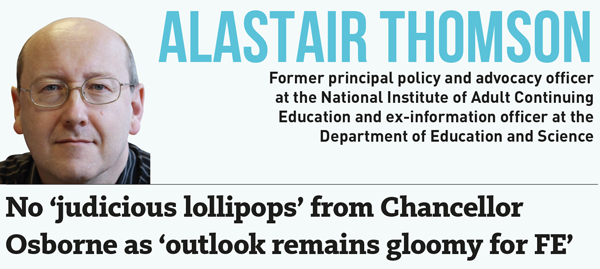Unions and business leaders have clashed over the issue of investment in training after Chancellor George Osborne announced the end of employers’ National Insurance Contributions (NIC) for apprentices under 25.
Mr Osborne announced on Wednesday (December 3) that employers would no longer pay NICs for apprentices under 25 from 2016. It was already the case, after last year’s Autumn Statement, that from April they won’t have to pay NICs for apprentices under 21.
Neither concession extends to learners themselves though, prompting the Association of Teachers and Lecturers (ATL) to call for the employers’ savings to go towards training.
But the Confederation of British Industry (CBI) insisted the concession must be recognised as an incentive.
Dr Mary Bousted (pictured), general Secretary of the ATL, said: “The purpose of apprenticeships should be to educate and train young people, not just to provide cheap labour for employers.
“We hope the government asks employers to put the NICs saving towards training their apprentices or developing apprenticeship training with colleges.”
And Ingrid Waterfield, director in KPMG’s People Powered Performance team, said: “The onus is now on employers to invest the money they would have spent on NICs on skills development, and talent management.”
However, a CBI spokesperson responded: “Businesses already invest significant resources into apprenticeships through internal mentoring, wages and work foregone.”
And National Hairdressers’ Federation president Paul Curry said: “We applaud the Chancellor’s announcement that he will abolish the National Insurance ‘jobs tax’ on apprentices. This will potentially benefit the many, many hairdressers and barbers who already invest in youth training and employment.”
Chris Jones, chief executive of City & Guilds, said: “This will incentivise employers to invest in young people and reduce the financial and administrative burden of
doing so.”
Employers currently make NICs for employees earning more than £153 a-week, although apprentices on the relevant National Minimum Wage (NMW) of £2.73 an-hour would not breach that threshold.
Joe Vinson, National Union of Students vice president for FE, said: “As apprentices are on such a low wage anyway, they won’t reach the threshold to make NICs and receive things like sick pay or other benefits that employees on the NMW are entitled to.”
Meanwhile, Association of Employment and Learning Providers chief executive Stewart Segal said he wanted the NIC exemption “applied in respect of all previously unemployed apprentices taken on by an employer”.
Martin Doel, chief executive of the Association of Colleges, said: “Encouraging more employers to offer apprenticeships is important, but the government must work with colleges to ensure that employers are ready to take on apprentices.”
But concerns have been raised that the autumn statement, which also included an announcement of £20m for careers advice, did not go far enough for adult learners.
David Hughes (pictured), chief executive of the National Institute of Adult Continuing Education, said: “By making young people a priority there is a danger that the impending adult skills crisis will continue to threaten future economic prospects and limit social mobility.
“The focus on training for young people is vital, but is only one part of the solution. Over the next 10 years there are anticipated to be almost twice as many job vacancies as there will be new labour market entrants to fill them. The government must therefore support all ages if they are to achieve their central ambition of creating a ‘more highly-skilled labour market’.”
Click here for more coverage and a link to the Autumn Statement document.
Uncertainty over £20m for careers guidance
Plans to invest £20m in careers advice have been cautiously welcomed by the National Careers Council (NCC) amid uncertainty over where the money will be spent.
The Treasury said it could not go into detail on its plans for the funding — revealed in the Autumn Statement — but the NCC, which has highlighted a lack of consistency and availability in careers advice, said it was an “important step”.
Chair Deirdre Hughes said: “This is an important step in the right direction. The key will be how the funds will be used to have the greatest impact and I will be very interested to see how the plans unfold.
“It would always be good to have more money. One of our three options we gave to government to improve services was costed at £17.5m, so £20m is a good step.”
Martin Doel, chief executive of the Association of Colleges (AoC): “In announcing the investment of £20m to improve careers advice and support for young people the government must now ensure that careers education is part of the curriculum.”
Dr Mary Bousted, general secretary of the Association of Teachers and Lecturers, said the £20m should be “spent on high quality face-to-face careers advice and guidance in every area of the country, training careers professionals, supporting partnerships with employer, rather than on IT-led solutions which don’t work for many young people, particularly those with the greatest need”.
The government will also pilot career-change work experience and training opportunities for older benefit claimants.
It wasn’t meant to be like this of course. When the Coalition took office in 2010, the idea was to have halved the deficit by 2015/16, not to have to borrow £200m more than forecast just eight months ago in the budget. At this point in the electoral cycle, the intention was that the Chancellor would point to a job well-done and deliver some judicious lollipops to ensure triumph next May.
While the government can, rightly, point to better economic growth than the rest of the EU, falling unemployment and low inflation, the stark fact is that the recovery is desperately fragile and that tax revenues are way, way, lower than predicted.
Given this background, George Osborne’s Autumn Statement deployed his undoubted political skills to make a silk purse from a sow’s ear and the fact that post-school education and training featured at all is testament to the slowly growing recognition that FE and skills has political salience, although many in the sector will be frustrated that politicians fail to grasp the sector’s potential to strengthen the economy and promote social mobility.
The decision to abolish employer National Insurance contributions for apprentices aged under 25 was evidence of the Chancellor’s acumen — it makes a nice headline, signalling the government’s goodwill and commitment but actually costing the Treasury peanuts in terms of income foregone.
The announcement of £20m to improve careers advice and support for young people is another example of showing concern and being seen to be doing something without acknowledging that many of the problems in careers education, information and guidance have been of the Coalition’s own making. The misguided decision of Michael Gove not to match Department for Business, Innovation and Skills funding for a National Careers Service with Department for Education cash was a massive error that £20m is not going to rectify although it does, at least, acknowledge that current policy has resulted in a total car-crash.
While the announcement of reforms to post-graduate funding will not affect most FE providers directly the fact is that, at a time of tightening budgets, every penny that goes to support the most educationally privileged is at the expense of others with more modest educational expectations.
As is often the case, some of the more interesting announcements are the single-sentence ones. An example of this is the three quarters of a million pounds allocated for a new National College for Onshore Oil and Gas. This is good news for Blackpool but also signals that the debate about fracking has moved from “whether” to “how?”.
I was also intrigued by the announcement that “government will also work towards enabling greater multi-year certainty in funding for schools and certainty for adult education providers where appropriate, in the context of area based strategies”. The whole localism agenda remains fluid and this is one announcement that needs unpacking.
Another ‘straw in the wind’ comes in the announcement that the Behavioural Research Centre for Adult Skills and Knowledge (ASK) will get £5m to conduct pilots using Children’s Centres to provide employment support and access to basic skills training. This suggests that, at last, the government is starting to join-up its thinking around family learning.
It is also suggested that programmes to promote mid-life career reviews, are now influencing policy — from April 2015 the government has agreed to pilot career change work experience and training opportunities for older benefit claimants.
Overall though, the outlook remains gloomy for FE. Whichever party or parties form the next administration, the climate will remain austere and sector organisations will need to work together to defend budgets.












Your thoughts